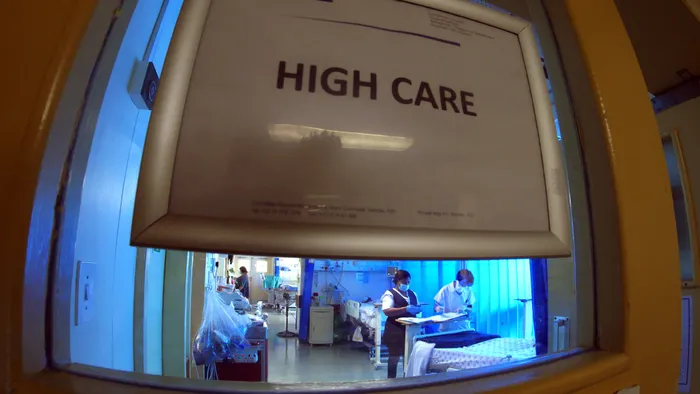
South Africa is facing a critical shortage of ICU beds and skilled staff to man those units
Image: Ian Landsberg/ANA Archive
The Gauteng Department of Health (GDoH) has come under fire following revelations that the province’s public hospitals have only 751 ICU nurses, less than half of the 1,760 needed to adequately serve its population.
The crisis was laid bare in a written response by Gauteng Health MEC Nomantu Nkomo-Ralehoko to the Democratic Alliance (DA) inquiry in the Provincial Legislature, where she confirmed the province is operating with less than half the ICU nurses it needs. This is according to the DA Gauteng Shadow MEC for Health, Jack Bloom.
Bloom said Nkomo-Ralehoko raised alarm over the ICU nurse shortage, citing increased patient deaths, delayed surgeries, and staff burnout. He added that the crisis is driving experienced nurses away and deterring new ones, putting patient safety at serious risk.
"Increased patient mortality, decreased quality of care, increased workload and burnout, delayed or cancelled procedures/surgeries, increased length of stay, negative patient experience of care, increased healthcare costs from overtime and temporary staffing, persistent shortages can discourage potential nurses from pursuing ICU careers and lead to experienced lCU nurses leaving the profession, and insufficient staffing can undermine patient safety initiatives, such as infection prevention and control and medication safety programmes."
He further revealed that, ideally, Gauteng should have between 1 600 and 3 200 ICU beds for its 16 million residents, based on the guideline of 10 to 20 ICU beds per 100 000 people, meaning the province would need 1 760 to 3 520 ICU nurses to properly staff them.
Bloom also expressed concern over the 250 unfilled ICU nurse vacancies.
"I am concerned that there are 250 ICU nurse vacancies, which means that one in four ICU nurse positions are unfilled despite the vast need. The MEC blames ‘budget constraints and few Speciality Nurses in ICU.’"
He reiterated that the lack of ICU nurses is a major reason why many operations are cancelled, as emergency cases take precedence. He added that it also contributes to long waiting times for surgeries, with more than 34,000 people on the waiting lists.’
IOL previously reported that South Africa is grappling with a critical shortage of ICU beds in the public health sector, with an average of just five beds per 100,000 people. In some provinces, the situation is even more dire, with as few as one ICU bed available per 100 000 residents.
This information comes from Professor Fathima Paruk, head of Critical Care Services and Emergency Medicine at the University of Pretoria’s Faculty of Health Sciences, reiterating Bloom’s guideline.
She presented these alarming statistics during her inaugural address, titled “Carpe Diem: Achieving Efficient and Fair Allocation of Critical Care Across South Africa.”
Paruk described the shortage of ICU beds in the country as a complex and multifaceted challenge.
“Hospitals are going to need more and more ICU beds because patients are living longer. ICU can save lives, and when patients live longer, they have more comorbidities, so they end up getting sick more often.”
In 2022, the GDoH faced a similar challenge and took steps to address the shortage of ICU nurses by prioritising the filling of vacant nursing posts to help close the province’s critical skills gap.
At the time, the GDoH reported having approximately 659 ICU nurses and said it was working to increase this number by also utilising the 317 vacant Professional Nurse Grade 1 posts to strengthen ICU capacity and other critical specialities.
In response, the Gauteng Department of Health said to augment the 791 filled positions for Intensive Care Unit (ICU) nurses, the department is reviewing the current service delivery model on utilising ICU nurses in the four hospital clusters, as they are critical, scarce skills.
It said as part of increasing the training of ICU nurses, MEC for Health and Wellness Nomantu Nkomo-Ralehoko stated during the Provincial Legislature sitting that the Gauteng College of Nursing has applied to the South African Nursing Council to increase the scope of training for ICU nurses from 85 to 100 per annum to address skills shortages.
In addition, the department added, there is an 80-hour upskilling programme on ICU that is currently being implemented, where 160 professional nurses from clinical facilities are being trained on an annual basis.“We acknowledge the implications of the shortage of ICU nurses, which is why the ICU is one of the units being prioritised by the Gauteng Department of Health.
‘‘Moreover, the Department has reviewed its organisational structure to accommodate an increased number of nursing speciality posts,” concluded MEC Nkomo-Ralehoko.
The Star
masabata.mkwannazi@inl.co.za